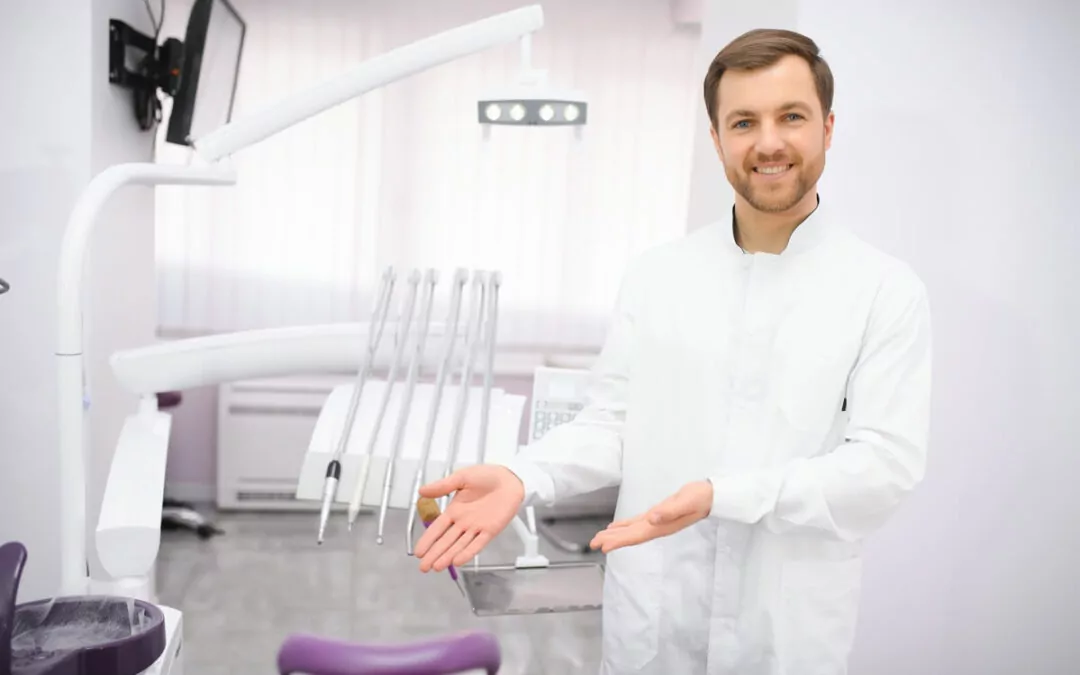Keywords for SEO are specific words or phrases that people use when conducting online searches. These keywords play an important role in search engine optimisation (SEO) as they support search engines understand the content and intent of web pages. By strategically using keyword ideas and incorporating relevant keywords into website content, meta tags, and other SEO elements, businesses can increase their visibility in search engine results pages (SERPs) and bring organic traffic.
How To Get High-Value SEO Keywords For A Dental Practice?
Getting high-value SEO keywords for your dental practice is essential to improve or maintain your search engine rankings and attract targeted organic traffic. Here are some effective strategies to help you identify and optimise for valuable dental keywords:
Understand Your Target Audience
Begin by understanding your target audience’s needs, preferences, and search behaviour. Consider the demographics, location, and specific dental services they are looking for. This knowledge will guide your keyword research process and help you choose the best keywords that align with their intent.
Brainstorm Seed Keywords
Start your SEO keyword research by brainstorming a list of seed keywords related to your dental practice. Think about the services you offer, location, specialisation, and any unique aspects of your practice. Include general terms like “dentist,” “dental clinic,” and “oral health,” as well as multiple keywords such as specific treatments like “teeth whitening,” “orthodontics,” or “dental implants.”
Leverage Keyword Research Tools
Utilise keyword research tools to expand your seed keywords and find additional high-value keywords. Tools like Google Keyword Planner, SEMrush, Ahrefs, and Moz Keyword Explorer can provide valuable insights into monthly search volume, competition, and related keywords. These tools will help you discover popular keywords that your target audience is searching for.
 Focus on Long-Tail Keywords
Focus on Long-Tail Keywords
Long-tail keywords are more specific and typically consist of three or more words. They may have lower search volumes but tend to have higher conversion rates as they reflect more intent.
For example, instead of targeting “dentist,” focus on long-tail keywords like “cosmetic dentist in [your location],” “emergency dental care near me,” or “pediatric dentist for children in [your city].”
Analyse Competitors
Analyse your competitors’ websites to identify keywords they are targeting successfully. Tools like SEMrush and Ahrefs allow you to enter competitor URLs and obtain insights into their organic keywords. This analysis can help you discover valuable keywords you may have missed and uncover new content ideas.
Consider Local SEO
For dental practices targeting a specific geographic area, local SEO is crucial. Incorporate location-specific keywords into your strategy, such as “dentist in [your city],” “best dental clinic near me,” or “family dentist [your town].” Include location modifiers in your website content, meta tags, and local business listings to improve your visibility in local search results. The location-specific keyword is usually a primary keyword.
Prioritise High-Intent Keywords
Focus on keywords that indicate high intent, as they are more likely to convert into actual patients. Terms like “affordable dental implants,” “emergency dentist open now,” or “cosmetic dentistry consultation” reflect strong intent. Create targeted content around these keywords to attract users who are actively seeking specific dental services.
Incorporate Patient Questions
Consider the common questions and concerns your potential patients may have and incorporate them into your keyword strategy. Use tools like Answer the Public, Quora, or online dental forums to discover the questions people are asking related to dental topics. Create content that addresses these questions and optimise for relevant long-tail keywords.
Optimise On-Page Elements
Once you’ve identified your high-value keywords, optimise your website’s on-page elements. Include target keywords in your page titles, meta descriptions, headers, and throughout your content naturally. However, avoid keyword stuffing, as it can harm your rankings. Focus on creating informative and engaging content that incorporates your keywords in a user-friendly manner.
Monitor and Refine
Keyword research is an ongoing process. Regularly monitor your website’s performance using tools like Google Analytics and Search Console. Analyse which keywords are driving the most traffic, conversions, and engagement. Refine your strategy by targeting new keywords, optimising underperforming pages, and creating fresh content to align with evolving search trends.
 Create Valuable Content
Create Valuable Content
Alongside keyword optimisation, focus on creating valuable, informative, and quality content that meets the requirements of your prospective patients. Develop articles, blog posts, and resources that address common dental concerns, oral hygiene tips, and treatment options. Valuable content not only helps with SEO but also positions you as an authority in the dental field.
Remember, selecting high-value SEO keywords for your dental practice is a dynamic process. Stay updated with the latest marketing trends, monitor keyword rankings, and adapt your strategy accordingly.
By investing time and effort into comprehensive keyword research and optimisation, you can improve your online visibility, attract qualified traffic, and grow your dental practice.
What Are The Different Types Of Keywords For SEO?
Different types of keywords for SEO can be categorised based on their characteristics and intent. Understanding the different types of keywords can help you create a well-rounded SEO strategy. Here are some common types of keywords for SEO:
Broad Keywords: Broad keywords are general terms that have a wide scope and high search volume. Examples include “dentist,” “healthcare,” or “online shopping.” While these keywords may attract a large amount of traffic, they can be highly competitive and may not always result in high-quality leads or conversions.
Long-Tail Keywords: These are more specific and usually consist of three or more words. The keywords tend to have lower search volumes but have higher conversion rates. Examples include “emergency dentist in [location],” “best teeth whitening in [city],” or “affordable dental implants near me.” Long-tail keywords are valuable for targeting niche audiences and capturing highly targeted traffic.
Commercial Keywords: Commercial keywords indicate that a user is in the consideration or buying stage of their customer journey. These keywords often include terms like “buy,” “discount,” “best price,” or “coupon.” For example, “buy electric toothbrush online” or “discounted dental implants.” Optimising for commercial keywords can help attract users who are ready to make a purchase.
Informational Keywords: Informational keywords reflect users’ intent to gather information or learn about a specific topic. These keywords often include terms like “how to,” “tips,” “guide,” or “benefits.” Examples include “How to brush teeth properly,” “Tips for preventing cavities,” or “Benefits of orthodontic treatment.” Creating informative and valuable content around informational keywords can help settle your website as a reliable source of information.
Local Keywords: Local keywords include location-specific terms and are essential for businesses targeting a specific geographic area. Examples include “dentist in [city],” “family dentist near me,” or “paediatric dentist in [location].” Optimising local keywords is crucial for attracting local patients and improving local search visibility.
Branded Keywords: Branded keywords include the name of your business or specific products/services you offer. Examples include “MediBoost dental marketing,” “MediBoost SEO services,” or “MediBoost dental practice growth.” Optimising for branded keywords helps strengthen your online brand presence and attracts users who are specifically searching for your business.
LSI Keywords: Latent Semantic Indexing (LSI) keywords are terms related to the main keyword or topic. Search engines use LSI keywords to understand the context and relevance of a web page. For example, if your main keyword is “dental implants,” LSI keywords could include “implant surgery,” “dental implant cost,” or “dental implant procedure.” Incorporating LSI keywords naturally within your content can improve its SEO.
It’s important to note that your particular keyword and selection should align with your target audience’s intent and your overall SEO strategy. Combining different types of keywords in your content and optimisation efforts can help you reach a wider audience, improve search engine rankings, and attract relevant traffic to your website.
What Happens If Your Content Is Updated Online Without SEO Optimisation?
If your content is updated online without SEO optimisation, you may miss out on several important benefits and opportunities for your website’s visibility, search engine rankings, and organic traffic. Here’s a closer look at what can happen if your blog post or content is not SEO optimised:
- Decreased Search Visibility:
SEO optimisation plays a crucial role in improving your dental website’s visibility in search engine results pages (SERPs). Without proper optimisation, search engines may struggle to understand the context of your content, resulting in lower rankings. As a result, your website may not appear prominently in search results, making it harder for potential visitors to find you. - Missed Organic Traffic:
SEO optimisation helps attract organic traffic from search engines. When your content is not optimised, search engines may not consider it relevant to user search queries. Consequently, you may miss out on potential visitors who could have discovered your website through organic search. Optimised content ensures better visibility and increases the chances of attracting targeted organic traffic. - Lost Opportunities for Targeted Keywords:
Keywords play a major role in helping search engines understand your content. By not optimising your content with targeted keywords, you miss the opportunity to rank for specific terms that your target audience uses. This can result in lost opportunities to attract users actively seeking the information, products, or services you offer. - Limited User Engagement:
SEO optimisation not only helps with search rankings but also improves user experience and engagement, such as meta tags, title tags, and well-structured content, making it easier for users to navigate and understand your website. Without these optimisations, users may find it challenging to comprehend the content or navigate through your site, leading to lower engagement and higher bounce rates. - Poor Click-Through Rates (CTRs):
When your content appears in search results, the title and meta description serve as your website’s “advertisement.” Optimising these elements with compelling and keyword-rich copy can significantly impact click-through rates (CTRs). Without SEO optimisation, your titles and meta descriptions may lack relevance, compelling language, or clear calls to action, resulting in lower CTRs and missed opportunities to attract visitors to your site. - Reduced Conversion Potential:
SEO optimisation goes beyond attracting traffic; it aims to optimise conversions. By not optimising your content with relevant keywords, clear CTAs, and user-friendly design, you may miss out on potential conversions. Whether your goal is to generate organic patient leads, increase sales, or drive specific actions, SEO optimisation ensures your content is aligned with your conversion goals and encourages visitors to take the desired actions. - Inefficient Indexing by Search Engines:
Search engines use sophisticated algorithms to crawl, index, and rank web pages. SEO optimisation helps search engines understand and index your content more efficiently. Without proper optimisation, search engines may struggle to interpret your content accurately, leading to indexing issues, duplicate content problems, or misinterpretation of your site’s purpose. - Missed Opportunities for Competitive Advantage:
SEO optimisation is a competitive field, and your competitors are likely investing in optimising their content. By neglecting SEO, you miss out on opportunities to gain a competitive edge. Your competitors who have optimised content are more likely to appear higher in search results, attract more traffic, and potentially convert users who could have been your patients. - Limited Long-Term Growth:
SEO is a long-term strategy that needs ongoing effort and adaptation. By not optimising your content, you limit your potential for long-term growth and sustainable visibility. As search algorithms evolve and user search behaviour changes, your non-optimised content may become outdated and less relevant, further hindering your chances of attracting organic traffic and achieving long-term success.
In conclusion, updating your online content without SEO optimisation can lead to decreased search visibility, missed organic traffic, limited user engagement, poor click-through rates, reduced conversion potential, inefficient indexing by search engines, missed competitive advantages, and limited long-term growth. Investing in SEO optimisation ensures that your content is aligned with search engine algorithms, user intent, and industry best practices, ultimately driving better visibility, traffic, and engagement for your website.
Why Are Professionals Required To Manage SEO Optimisation Of Content?
Professionals are required to manage the SEO optimisation of content for several reasons. SEO optimisation is a complex and ever-evolving field that requires specialised knowledge, experience, and tools to effectively drive organic traffic, improve search engine rankings, and maximise the online visibility of a website. Here are the key reasons why professionals should handle SEO optimisation:
- Expertise and Knowledge:
SEO professionals have in-depth expertise and knowledge of the latest SEO trends, strategies, and best practices. They stay updated with algorithm changes, industry updates, and emerging techniques to ensure that your content is optimised to meet current standards. Their expertise allows them to analyse your website, identify optimisation opportunities, and implement effective strategies to improve your search rankings. - Technical SEO Skills:
SEO optimisation involves various technical aspects that require specific skills to handle effectively. Professionals are proficient in technical SEO elements such as website structure, indexing, site speed optimisation, XML sitemaps, schema markup, and canonicalisation. They have the technical know-how to optimise your dental website and ensure it follows the search engine guidelines, allowing search engines to crawl and index your content efficiently. - Keyword Research and Optimisation:
Keyword research is a primary aspect of SEO optimisation. Professionals have access to advanced keyword research tools and techniques to identify relevant and high-value keywords. They conduct thorough keyword research and analyse search volumes, competition, and user intent to select the most effective keywords for your content. With their expertise, they can strategically incorporate keywords into your content, meta tags, headings, and URLs for better search engine rankings and attract targeted organic traffic. - Content Optimisation:
Optimising content goes beyond keyword placement. Professionals understand how to optimise content for readability, user experience, and search engine crawlers. They ensure that your content is well-structured, properly formatted, and includes relevant headings, subheadings, and bullet points. They also focus on creating engaging and valuable content that relates to your target audience while satisfying search engine requirements. - On-Page Optimisation:
On-page optimisation involves optimising various elements within your web pages to enhance their visibility and relevance. Professionals optimise title tags, meta descriptions, URLs, image alt tags, and internal linking to improve search engine rankings. They craft compelling meta descriptions that encourage clicks, write keyword-rich title tags that accurately represent the content, and optimise URLs to reflect the topic or keywords. - Off-Page Optimisation:
Off-page optimisation involves building high-quality backlinks and establishing your website’s authority in the online space. Professionals have the expertise to develop effective link-building strategies, outreach to relevant websites, and earn authoritative backlinks. They understand the importance of natural link profiles and the potential risks associated with low-quality or spammy backlinks. - Technical Audits and Website Analysis:
SEO professionals conduct technical audits and comprehensive website analyses to identify any underlying issues that may affect your SEO performance. They use specialised tools to analyse factors such as site speed, mobile-friendliness, crawlability, and indexability. By identifying and resolving technical issues, professionals make sure that your dental website is optimised for search engines. - Ongoing Monitoring and Adjustments:
SEO optimisation is an ongoing process that requires continuous monitoring and adjustments. Professionals closely monitor your website’s performance, track keyword rankings, analyse traffic patterns, and assess user behaviour through various analytics tools. They use this data to make data-driven decisions, spot areas of improvement, and adjust strategies accordingly. Regular monitoring allows them to stay proactive, adapt to changes, and maintain your website’s visibility and rankings in search engine results. - Compliance with Search Engine Guidelines:
Search engines like Google have specific guidelines and policies that websites must adhere to. SEO professionals are well-versed in these guidelines and ensure that your website meets the requirements. They follow ethical SEO practices, avoid black-hat techniques, and focus on providing value to users. Compliance with search engine guidelines is crucial to avoid penalties, maintain your website’s reputation, and sustain long-term growth. - Time and Resource Efficiency:
Managing SEO optimisation requires significant time, effort, and resources. By taking professionals on board, you can save valuable time and allocate your internal resources more efficiently.
In conclusion, professionals are required to manage the SEO optimisation of content due to their expertise, technical skills, keyword research abilities, content optimisation strategies, on-page and off-page optimisation techniques, technical audits, monitoring capabilities, compliance with the search engine optimisation guidelines, and time efficiency. Working with professionals ensures that your website is effectively optimised for search engines, resulting in improved visibility, increased organic traffic, and sustainable online success.
Are Other Dental Practices Putting Up SEO-Optimised Content Too?
Absolutely, other dental practices are significantly leveraging SEO-optimised content to improve their online visibility.

They are strategically integrating relevant keywords, optimising local SEO, and creating valuable, patient-centric content.
This not only increases their discoverability but also positions them as trusted experts in the field.
Furthermore, with fierce competition in the dental industry, SEO optimisation has become more of a necessity than an option, driving growth and patient acquisition.
What Is The Guarantee Of an Increase In Patient Base If I Optimise My Dental Content?
While there is no absolute guarantee in SEO, it significantly enhances the chances of increasing your patient base. Search engine optimisation plays a basic role in driving original traffic to your website, which translates to greater visibility and potentially more appointments. When your dental website ranks at the top of search engines for keywords relevant to your dental practice, it is more likely to be noticed by people searching for dental services.
However, simply attracting visitors to your website isn’t enough. High-quality content plays a significant role in converting these visitors into actual patients. If your content is engaging, informative, and adds value, it helps build trust and credibility with potential patients. Additionally, a well-designed, user-friendly website with clear calls to action further facilitates this conversion process.
Optimising for local SEO allows you to target patients specifically in your geographical area. By appearing in local search results, you attract a more relevant audience who are likely to be seeking dental services in your vicinity. This again increases the chances of expanding your patient base.
It’s important to remember that SEO is not a one-time effort but an ongoing process. The digital landscape is constantly changing, and maintaining a robust online presence requires continuous optimisation and content updates. As such, while SEO cannot provide a guaranteed number of new patients, it significantly increases the likelihood of growth in your patient base over time.
Our dental marketing agency, Mediboost, has served numerous successful dental professionals in Australia over the course of years to effectively present themselves online, generate more revenue and maximise their ROI. Contact our team today on 1300 163 058.
References
The Role of Keywords in SEO Success – LinkedIn
https://www.linkedin.com/pulse/role-keywords-seo-success-zulqarnain/
Why Are Keywords Important? – LinkedIn
https://www.linkedin.com/pulse/why-keywords-important-siva-yenneti/?trk=pulse-article
What is SEO for my dental office, and why should I care? | Dentistry IQ
https://www.dentistryiq.com/practice-management/marketing/article/16360625/what-is-seo-for-my-dental-office-and-why-should-i-care


 Focus on Long-Tail Keywords
Focus on Long-Tail Keywords Create Valuable Content
Create Valuable Content

